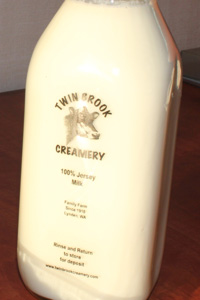The debate rages on over which is better for our health: raw milk or pasteurized milk? There appear to be significant benefits and drawbacks to each. But does one outweigh the other? Health food aficionados argue that raw milk is a greater benefit to health because of the beneficial bacteria, proteins, enzymes, and important vitamins and minerals it contains that the pasteurization process destroys. Nevertheless, those who are opposed to raw milk assert that if milk is not pasteurized, dangerous germs and bacteria will be allowed to proliferate, which can possibly result in severe illness. There is no straightforward answer regarding which of these arguments has the most merit.
A Short History of Pasteurization
 The pasteurization of cream that was used for butter was first used in England in the late 18th century, followed shortly by its use in the colonial US. Of course, at that time it was not called pasteurization, as the name for this process is due to Louis Pasteur, the French microbiologist who discovered that microorganisms were the cause of beer, wine and milk spoilage. He invented the process by which heat was introduced to kill the bacteria and mold present in the liquid.
The pasteurization of cream that was used for butter was first used in England in the late 18th century, followed shortly by its use in the colonial US. Of course, at that time it was not called pasteurization, as the name for this process is due to Louis Pasteur, the French microbiologist who discovered that microorganisms were the cause of beer, wine and milk spoilage. He invented the process by which heat was introduced to kill the bacteria and mold present in the liquid.
By heating raw milk to 161? Fahrenheit for 15 seconds, you kill the dangerous pathogens present in it. This particular process has been used for over 100 years, and was first used in the US in the 1890s to help cut down on the spread of brucellosis and bovine tuberculosis, both of which were highly transmissible diseases at that time, and they were believed to be spread by the consumption of raw milk. The most common microorganisms it destroys today are salmonella, Listeria monocytogenes, Campylobacter jejuni and E. coli; these pathogens are particularly dangerous to the elderly, children, pregnant women and those whose immune systems are compromised.
This all would make it seem that pasteurization was the way to go. However, the pasteurization process kills not only the organisms in milk that may cause harm, it kills the ones that are beneficial as well. Some scientists are of the opinion that the rates of autoimmune diseases such as allergies, Crohn?s disease, multiple sclerosis and type?I diabetes, which have been rising steadily over the past 50 years, may be a result of the fact that our lifestyles are actually too clean. Studies have shown that those who have been raised on farms suffer less from these types of diseases due to the workout their immune systems get from a young age with regular exposure to different microorganisms.
Some of the substances that could benefit our health that pasteurization destroys include lactoferrin, which is a useful aid to iron absorption, and which demonstrates antiviral and antimicrobial properties, among which is the killing of the bacteria that are responsible for cavity formation in the teeth; the antibodies referred to as immunoglobulins, which reduce bacteria and viruses and have been shown to reduce asthma symptoms; and the beneficial bacteria that is found in probiotic drinks and yogurt, Lactobacilli. Lactobacilli digests lactase, which makes it possible for many of those who are lactose intolerant to eat dairy products. It also helps in iron, calcium and phosphorus absorption.
Considering the size of the US population, the incidence and severity of problems related to consuming unpasteurized dairy products is not too bad; the US has had 70 cases of food poisoning each year on average from those who have eaten raw dairy products, according to statistics from the Centers for Disease Control and Prevention. Modern industrial farming methods, in which large numbers of animals are kept in close, confined quarters encourage the proliferation of pathogens, which is the reason why most dairy cows are treated with antibiotics on a routine basis.
However, dairy cows that are put out to pasture and feed on grass each day routinely have lower pathogen levels found in their digestive tracts. Not only that, but the milk they produce also has less saturated fat and contains greater levels of CLA (conjugated linoleic acid), a fatty acid that has been shown to protect against cancer and to help in maintaining a healthy weight.
Many people even prefer the taste of raw milk once they have tried it. If you would like to try raw milk, ensure that it has come from cows that are grass fed from an organic dairy with a good reputation. You can often find one represented at a farmers? market. Although it is a good idea to keep the possible risks in mind, the health benefits are many.
Source: http://www.healthguidance.org/entry/16579/1/Which-Is-Better-Raw-Milk-or-Pasteurized-Milk.html
john edwards conocophillips octomom dan savage new world trade center kellen moore guy fieri
No comments:
Post a Comment
Note: Only a member of this blog may post a comment.